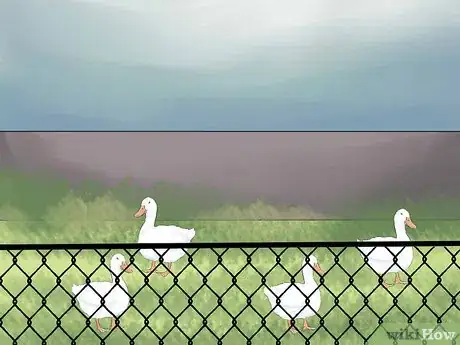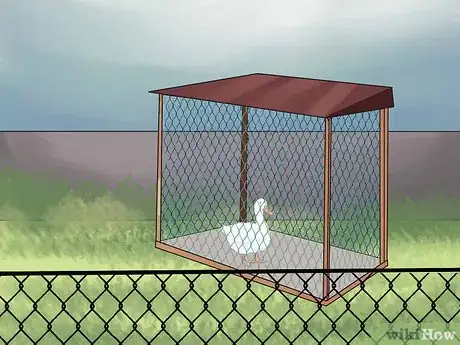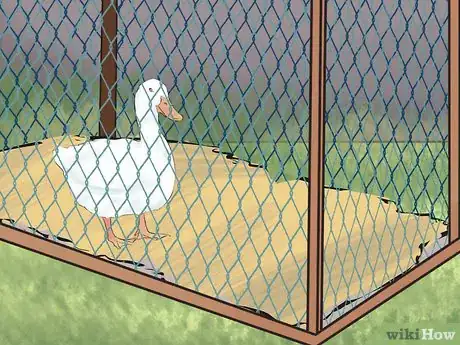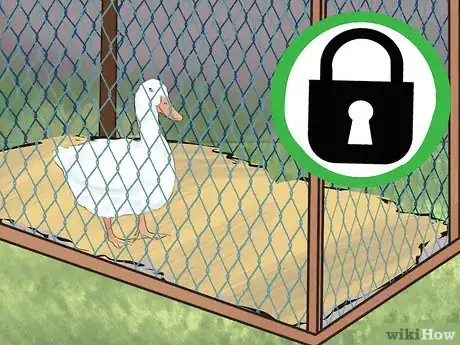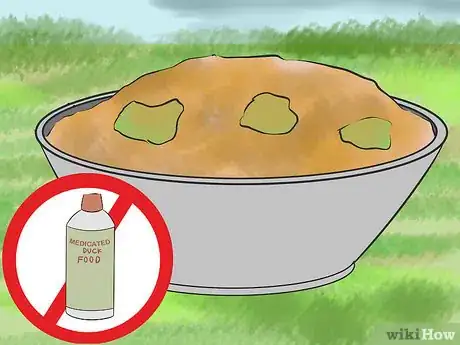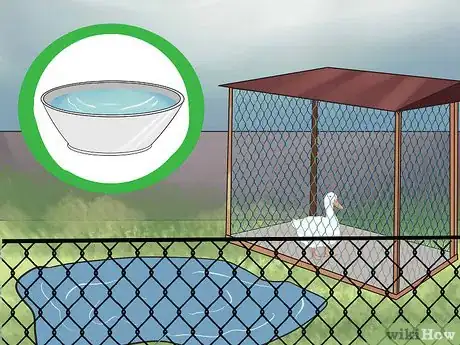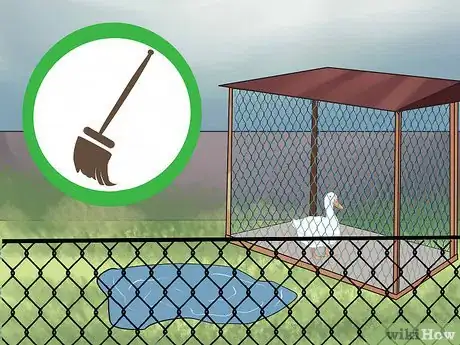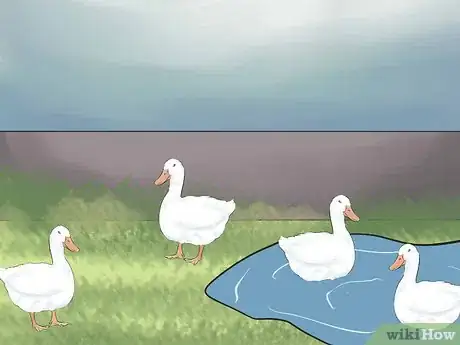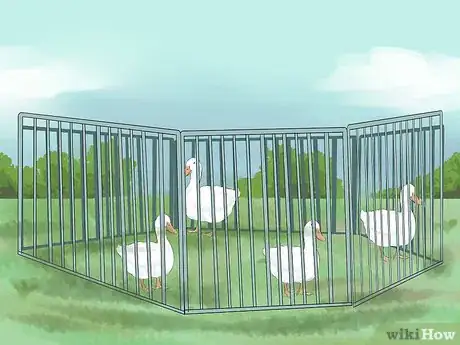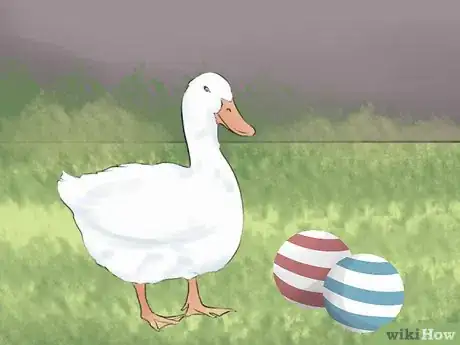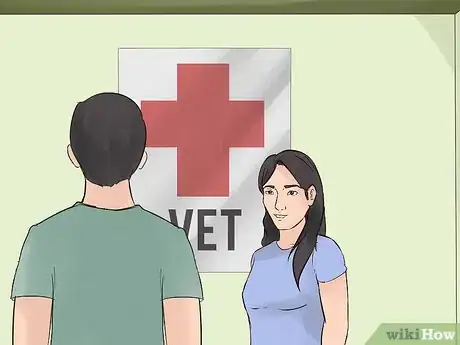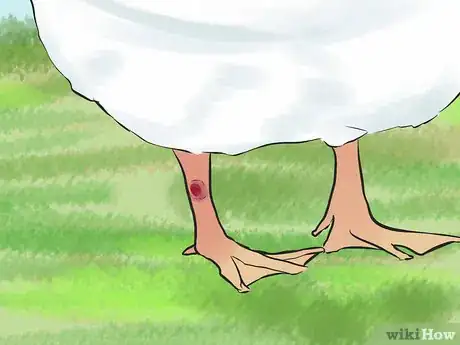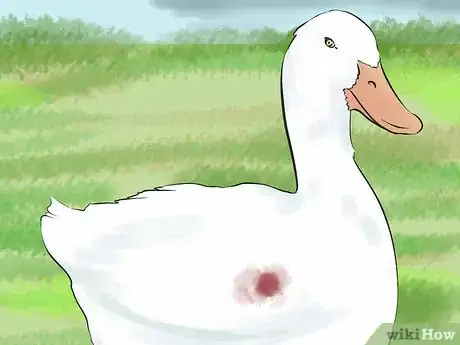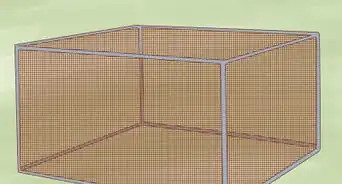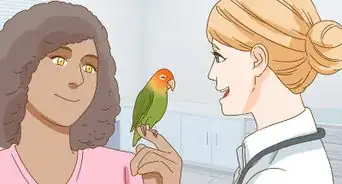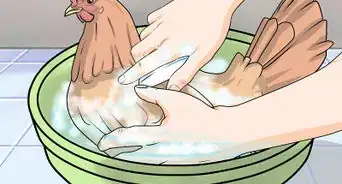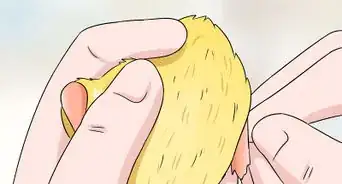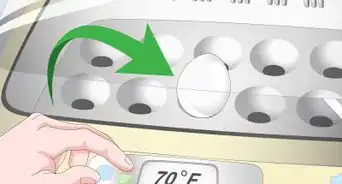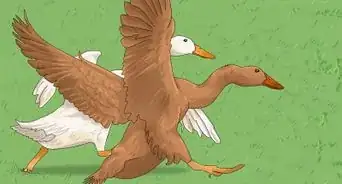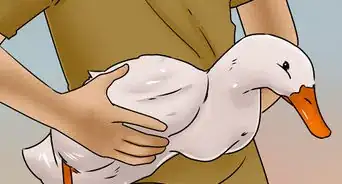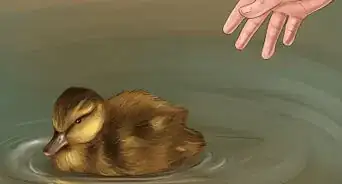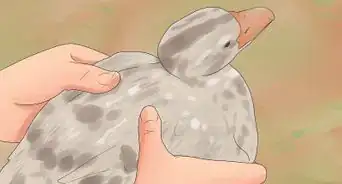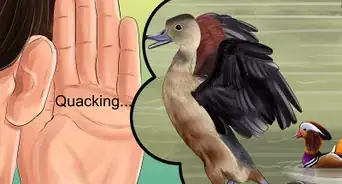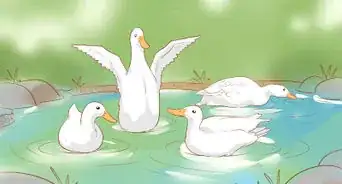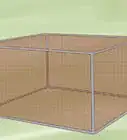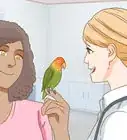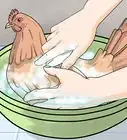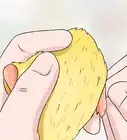This article was co-authored by Melissa Nelson, DVM, PhD. Dr. Nelson is a Veterinarian who specializes in Companion and Large Animal Medicine in Minnesota, where she has over 18 years of experience as a veterinarian in a rural clinic. She received her Doctor of Veterinary Medicine from the University of Minnesota in 1998.
There are 8 references cited in this article, which can be found at the bottom of the page.
wikiHow marks an article as reader-approved once it receives enough positive feedback. In this case, 96% of readers who voted found the article helpful, earning it our reader-approved status.
This article has been viewed 196,669 times.
Ducks are intelligent animals that can develop feelings of loyalty towards human owners, and so can make good pets for individuals with the time and patience to care for them. Ducks are social animals and need to be kept in groups of at least two. You'll also need to protect ducks from potential predatory animals, and they need around-the-clock access to water.[1] Ducks require significant time and financial expenditure, and are best raised in an open, rural area.
Steps
Housing the Ducks
-
1House your ducks in a secure pen. Ducks require a safe structure to live in. An enclosure or pen will keep them from wandering (or flying) away from your house and allow them a measure of safety. You can erect a suitable enclosure using chicken wire or another fencing material. If the ducks will be spending their days in this pen, it should provide 1.5 square meters (16 square feet) of space per duck.[2]
- Most commercially grown ducks are too heavy to fly far, and will stay near sources of food and water.[3] To be on the safe side, however, be sure to put a layer of fencing material over the top of the duck pen, so that they don't fly away.
- Placing a layer of fencing material over the top of the pen will also keep birds of prey like hawks and eagles from entering the pen and taking away a duck.
- If you don't already have an erected enclosure, you should be able to find all of the necessary components (at minimum: chicken wire and fence posts) at your local hardware or home-supply store.
- In areas where predators like raccoons, skunks, and coyotes are common, the pen must be sturdy enough to keep them out. Raccoons can tear through flimsy material, so you need to use a strong, heavy gauge wire. These animals can also dig, so the wire should be buried at least 6 inches (15.24 centimeters) underground around the entire perimeter of the pen.
-
2Provide your ducks with a small shed. This shed should be located inside of the pen or enclosure, and should be stable enough to provide ducks with protection from wind and inclement elements. Make sure that the shed has firm, stable walls which are opaque and can provide the ducks with shade on sunny days.[4]
- If the ducks will be sleeping in the shed, it should provide 0.5 square meters (5 square feet) of space per duck.
- Since ducks defecate frequently, the housing shed needs to be well ventilated.
Advertisement -
3Lay rice hulls or straw inside of the ducks' shed. Good care is required in this area if you would like your ducks to remain healthy. Be sure to give them new hay or straw at least once a week. This material will serve as your ducks' bedding and also as a surface for them to walk on.[5]
- You should be able to purchase rice hulls or straw at a farm-supply store.
-
4Lock the door to your ducks' house. Be sure that the ducks will not be able to open the lock and get out of their house. Also, be sure that other animals won't be able to get into their home and eat the ducks or their eggs. However, make sure that the lock is easy to open and close when you enter and exit their house.
- If you prefer not to purchase a lock for the door of the ducks' shed, try pushing a heavy stone at the bottom of the door.
- If your area has a heavy predator population, the shed and its door should be strong and sturdy. In this case a good lock is imperative to lock the ducks in at night when predators are active.
Feeding and Cleaning Up After the Ducks
-
1Provide your ducks with non-medicated poultry food. Ducks will eat frequently throughout the day. Rather than establishing a specific feeding time, allow them constant access to food. Domesticated ducks typically eat pellet mash. You can also feed your ducks chopped vegetables and worms (of any variety) as the occasional treat.[6]
- You should be able to buy a good-quality poultry feed at your local pet store or farm-supply store.
- Do not give your ducks medicated food. This type of poultry food is engineered to be given to hens in a poultry farm to stop the spread of disease. Feeding medicated food to your ducks could harm their health.
- Read the labels on your feed carefully to make sure it's suitable for ducks. Typically, non-medicated chicken feed is suitable for adult ducks.
-
2Keep fresh drinking water out at all times. Ducks need constant access to water. Not only do they drink about 1 liter (0.25 gallons) of water a day, but they also need water to help them swallow and digest their food.[7] Provide the ducks with water in a metal dish, and place this next to a similar dish containing the ducks' pellet mash food.
- If the ducks have immediate access to a pond or lake in their enclosure, they will be less reliant on you to provide them with drinking water.
-
3Clean out the duck shed daily. Ducks are messy, unclean animals; they defecate frequently and, unlike cats and dogs, cannot be trained to use one specific area for their bathroom. In order to keep the ducks' shed clean and to maintain their good health, you'll need to scoop out all of the duck feces from the floor of their living area. Also, change their food and water and wash the shed walls as necessary.[8]
- Cleaning the shed is even more important in the winter, since ducks will be spending more time inside of the shed and less time outside. You may need to clean the shed multiple times a day.
- The more ducks you have, the more often you will need to clean the shed.
- By providing a roomy shed with plenty of bedding material, you will be able to keep your ducks reasonably clean and comfortable.
Keeping Your Ducks Active
-
1Allow your ducks to socialize. Ducks are highly social animals, and will become lonely, sad, and unhealthy if deprived of other ducks' company. Give your ducks plenty of time during the day to socialize, eat, and (if they're juveniles) play together.[9] If you're acquiring ducks for the first time, never adopt just one. Always buy or adopt at least two ducks so they can keep one another company.
- If you're adopting the ducks as young ducklings, it will be challenging to identify the gender of the ducks. If you're hoping for a male and female pairing, you may be disappointed.
-
2Give your ducks daily access to a body of water. While ducks do need water to drink and eat their food with, they also need a deeper body of water to groom themselves in. Ducks love to swim and it keeps them clean. If the ducks don't already have a small pond or lake within their enclosure, you can shepherd them to a nearby pond on your property.[10]
- You can also fill a bath with water for the ducks to swim in.
- Ducks will also groom themselves in available water in order to keep their feathers, bills, eyes, and other body parts clean. Consequently, the water set out needs to be deep enough for them to fully submerge themselves in.
- The pond or body of water should be at least 8 inches (20 cm) deep. While a small plastic “kiddie” pool will technically fulfill the ducks' needs, they will be able to exercise more if given a larger pool or actual pond to swim in. If you don't want them in your actual swimming pool, check out the wikiHow: How to Keep Ducks Out of a Pool.
-
3Allow your ducks to forage in a garden. If you have a garden near your house, you can let your ducks freely roam through it. Ducks enjoy eating grass found in gardens, and will also root around in your mulch to find worms and insect larvae. This will supplement the ducks' diet, satisfy their natural curiosity, and provide them with entertainment.[11]
- On the other hand, if you don't want ducks to get into your garden and eat greens and vegetables, you may need to erect a fence around the garden to keep inquisitive ducks out.
-
4Provide your ducks with toys to play with. Ducks are intelligent and naturally curious, and will be interested in playing with small objects. Set a small stuffed animal or a ball inside the ducks' enclosure, and over time, they'll start to pick up and play with the toy. If you want to play with the ducks, try rolling a toy ball towards them.[12]
- Make sure that any toys you provide are safe for the ducks to play with. Don't give them any toys that have small parts that the ducks may swallow.
Recognizing and Addressing Health Problems
-
1Talk to a veterinarian about worming your ducks. Ducks tend to be healthy pets and have relatively few medical problems. However, ducks may contract various forms of internal (intestinal) and external worms. On average, domestic ducks need to go through a de-worming procedure once every 6 months.[13] Speak with your veterinarian, and ask if they recommend a specific product that you can use at home.
- Regular swimming can help keep ducks healthy by allowing them to wash mites and other parasites out of their feathers. If your ducks do not have access to adequate water, they will be more likely to contract mites or worms.
-
2Inspect your ducks' feet for injuries or ulcers. Ducks' feet are sensitive and tender, and can be damaged from walking on rough surfaces. Look at your ducks' feet every couple of weeks—if you notice any “ulcers” (which cause sores, swelling, or limping), take your duck to the veterinarian.[14]
- To help protect your ducks' feet, cover the floor of their shed with a generous layer of straw or rice hulls. Avoid letting your ducks walk on bare concrete or cement.
-
3Watch for wing injuries. Ducks tend to be clumsy animals, and can easily damage their wings by running or flying into an immovable object in their environment. Regularly look for any ducks that seem to be favoring one wing, or that have a wing sticking away from their body at an odd angle. If you find that a duck has injured or broken a wing, take the animal to the vet immediately.[15]
- Juvenile ducklings can easily damage their wings while learning to fly, since juveniles are unsteady and inexperienced flyers.[16]
Expert Q&A
-
QuestionDo ducks make good house pets?
 Melissa Nelson, DVM, PhDDr. Nelson is a Veterinarian who specializes in Companion and Large Animal Medicine in Minnesota, where she has over 18 years of experience as a veterinarian in a rural clinic. She received her Doctor of Veterinary Medicine from the University of Minnesota in 1998.
Melissa Nelson, DVM, PhDDr. Nelson is a Veterinarian who specializes in Companion and Large Animal Medicine in Minnesota, where she has over 18 years of experience as a veterinarian in a rural clinic. She received her Doctor of Veterinary Medicine from the University of Minnesota in 1998.
Veterinarian They can, but are very, very messy animals when they eat and drink and they will defecate everywhere. Some people make diapers for ducks though.
They can, but are very, very messy animals when they eat and drink and they will defecate everywhere. Some people make diapers for ducks though. -
QuestionWhat not to feed the ducks?
 Melissa Nelson, DVM, PhDDr. Nelson is a Veterinarian who specializes in Companion and Large Animal Medicine in Minnesota, where she has over 18 years of experience as a veterinarian in a rural clinic. She received her Doctor of Veterinary Medicine from the University of Minnesota in 1998.
Melissa Nelson, DVM, PhDDr. Nelson is a Veterinarian who specializes in Companion and Large Animal Medicine in Minnesota, where she has over 18 years of experience as a veterinarian in a rural clinic. She received her Doctor of Veterinary Medicine from the University of Minnesota in 1998.
Veterinarian Ducks can be fed UNMEDICATED chicken food (pellets or crumbles) and greens like lettuce or Romaine.
Ducks can be fed UNMEDICATED chicken food (pellets or crumbles) and greens like lettuce or Romaine. -
QuestionCan you keep chickens and ducks together?
 Melissa Nelson, DVM, PhDDr. Nelson is a Veterinarian who specializes in Companion and Large Animal Medicine in Minnesota, where she has over 18 years of experience as a veterinarian in a rural clinic. She received her Doctor of Veterinary Medicine from the University of Minnesota in 1998.
Melissa Nelson, DVM, PhDDr. Nelson is a Veterinarian who specializes in Companion and Large Animal Medicine in Minnesota, where she has over 18 years of experience as a veterinarian in a rural clinic. She received her Doctor of Veterinary Medicine from the University of Minnesota in 1998.
Veterinarian Yes they can be kept together. They can eat the same food (chicken food) but it will need to be unmedicated as the medication in chicken food can kill the ducks.
Yes they can be kept together. They can eat the same food (chicken food) but it will need to be unmedicated as the medication in chicken food can kill the ducks.
Warnings
- Ducks are curious and will eat nearly anything they find laying around.[17] Never let your ducks eat inedible, non-food objects such as string, napkins, or fake plants.⧼thumbs_response⧽
- Avoid giving ducks bread. Popular opinion to the contrary, bread is unhealthy for ducks. Bread will swell up in the ducks' crop (a temporary food-storage pouch in the throat) and can choke them, resulting in death.[18]⧼thumbs_response⧽
- Ducks carry Salmonella germs in their droppings. Ducks can also have salmonella germs on their bodies (especially around their feet and beaks), so it's important that you wash your hands immediately after any physical contact with your ducks.[19]⧼thumbs_response⧽
References
- ↑ https://www.caringpets.org/how-to-take-care-of-a-pet-duck
- ↑ http://kb.rspca.org.au/how-should-i-keep-and-care-for-my-pet-ducks_520.html
- ↑ https://www.tractorsupply.com/know-how_pets-livestock_chicken_tips-for-raising-ducks-and-ducklings
- ↑ http://kb.rspca.org.au/how-should-i-keep-and-care-for-my-pet-ducks_520.html
- ↑ http://kb.rspca.org.au/how-should-i-keep-and-care-for-my-pet-ducks_520.html
- ↑ https://www.caringpets.org/how-to-take-care-of-a-pet-duck/
- ↑ http://kb.rspca.org.au/how-should-i-keep-and-care-for-my-pet-ducks_520.html
- ↑ https://www.peta.org/blog/the-pros-and-cons-of-companion-ducks/
- ↑ https://www.peta.org/blog/the-pros-and-cons-of-companion-ducks/
- ↑ http://kb.rspca.org.au/how-should-i-keep-and-care-for-my-pet-ducks_520.html
- ↑ http://kb.rspca.org.au/how-should-i-keep-and-care-for-my-pet-ducks_520.html
- ↑ https://www.caringpets.org/how-to-take-care-of-a-pet-duck/
- ↑ http://kb.rspca.org.au/how-should-i-keep-and-care-for-my-pet-ducks_520.html
- ↑ http://kb.rspca.org.au/how-should-i-keep-and-care-for-my-pet-ducks_520.html
- ↑ https://www.caringpets.org/how-to-take-care-of-a-pet-duck/#health-care
- ↑ https://www.peta.org/blog/the-pros-and-cons-of-companion-ducks/
- ↑ https://www.peta.org/blog/the-pros-and-cons-of-companion-ducks/
- ↑ http://www.kidzworld.com/article/17525-taking-care-of-ducklings
- ↑ https://www.tractorsupply.com/know-how_pets-livestock_chicken_tips-for-raising-ducks-and-ducklings
About This Article
To take care of ducks, start by keeping them in a secure pen or other safe enclosure that provides plenty of space for them to move around. Next, provide your ducks with plenty of high quality, non-medicated poultry food so they can graze on it frequently throughout the day and make sure they have constant access to fresh water. Since ducks are very social creatures, it's also important to give them plenty of time during the day to socialize, eat, and play together. For tips on recognizing illness in ducks, read on!
